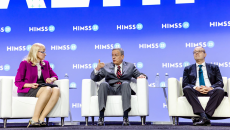Interoperability
Andrea Palm, deputy secretary at the U.S. Department of Health and Human Services, says the agency is striving to "put the people we serve at the center of what we do." Meanwhile, ONC officials offer updates on new Cures Act rules.
While stakeholders agree the new interoperability and decision support rules could improve quality outcomes, some note that significant up-front commitment is needed for health IT developers while providers still document care with unstructured data.
SPONSORED
Northern California health system wanted a solid foundation before digital transformation.
The aspirational model is intended to serve as a starting point and a path forward for healthcare, health data and government leaders to follow in creating HDUs, says the consortium of health data organizations.
The FHIR-enabled platform supports provider tools that integrate algorithms and machine learning to improve patient diagnoses.
Sharing patient information electronically from a hospital to post-acute care is not widespread, providers told CMS.
In Episode 3 of "Unlocking Big Data," sponsored by Arcadia, Anne Snowdon, Chief Scientific Research Officer at HIMSS, and Mary Kuchenbrod, Vice President, Data Operations at Arcadia, discuss the need for data accuracy in healthcare.
SPONSORED
How healthcare organizations can boost their data quality.
CHICAGO – "Without health there is nothing," said Hans Kluge, Regional Director for Europe at the World Health Organization, during the morning keynote Thursday at HIMSS23.
Healthcare organizations including ONC, Advocate Health, Mt. Sinai, Tufts Medicine, UC Davis Health and the VA are participating, and will share implementation tips and best practices to enable broader adoption of the interoperability standard.











